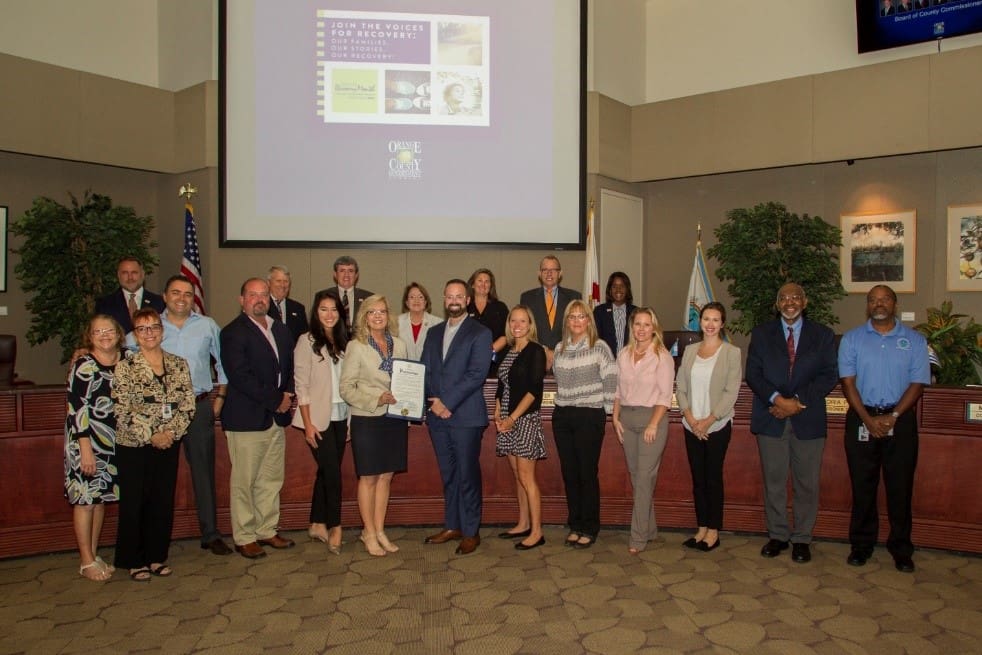The Orange County Drug Free Coalition began back in 1999, launched by former Mayor Mel Martinez, who later served as Secretary of Housing and Urban Development (HUD) under George W. Bush. The coalition is unique in that it is funded by Orange County government. The coalition office staff are Orange County government employees and the operational budget is funded by the county, thanks to the leadership and support of Mayor Teresa Jacobs and the Orange County Board of County Commissioners.
The coalition serves an urban and suburban population in Orange County, Florida, with a sizeable population of 1.3 million people. Within the county is the largest university in Florida, and over 72 million people visited the area in 2017. Over 200,000 students are within the local school system, which experienced a significant increase in enrollment, as evacuees from Hurricane Maria came to Orange County.
“Substance abuse is a community-wide problem and we need community-wide strategies to address it, not any one particular sector of the community. It’s a great way to invite people to the table,” said Carol Burkett, Director. “We work with the 12 sectors, including the k – 12 population and have an ongoing relationship with local colleges and universities.”
One of the coalition’s greatest accomplishments is a reduction of alcohol usage in middle and high schoolers, measured through the Orange County survey. From 2010 – 2016, middle and high schoolers’ alcohol use decreased 10 percent. The coalition implemented a number of strategies and campaigns to reduce alcohol use in their community, including:
- Youth Ambassador Drug Prevention Program – Started in 2012, the youth ambassador program was designed to enhance and promote drug free activities in the schools and communities. Students and teachers received trainings about innovative approaches to bring back to the classroom.
- Alcohol Literacy Challenge – Each year, the coalition has trained approximately 150 school counselors, community members, high school teachers, school resource officers with prevention strategies to take into the classroom. All training is provided for free and has proven to be very successful. Students are now using the curriculum and taking to their classroom setting.
- Alcohol Environment Scans – Local schools receive a stipend, if they complete all prevention activities and if they meet the standards. The coalition works with almost 20 middle and high schools and are looking to expand the initiative.
- Alcohol Literacy Training – As part of the Partnership for Success grant, one of six counties that received state funding, the coalition implemented a parent version of alcohol literacy challenge to help parents be better informed and better educated about the media messages that youth see. The literacy training provides information about what parents can do and what their options are, and how they can get the message of prevention across successfully.
- Law Enforcement Partners – One of the coalition’s key components is working with the Florida Division of Alcohol and Tobacco. Sector Noise and Alcohol Patrol (SNAP) partnered with Florida state police department to do compliance checks, bar checks, and noise patrol. In 2017, they conducted over 368 checks.
- Parent Resource Guide – During the Partnership for Success grant, the coalition developed a parent resource guide, focused on alcohol and expanding to other drugs. After doing a few focus groups, the coalition implemented a 12-page magazine. The coalition also found via focus groups, that putting a substance, such as alcohol or drugs on the front of magazine, parents were less likely to take it. However, they were more likely to pick up the magazine if there was an image of parents and a happy family on the front. Through funding, the coalition disseminates 200 guides in English and 100 copies in Spanish to each school in the county, gives them out at events and the guide is also available online at drugfreecoalition.org.
- Talk to Hear You Campaign – The SAMHSA campaign was displayed on local billboards in the county, included in utility bills that 118,000 citizens received. Additionally, the collateral was shared in theaters and online through Orlando Sentinel, Orlando Family Magazine and Val-Pak.
- TIPS training (Training and Intervention Procedures for retailers) – The coalition worked with on- and off-premise retailers, for free and provided ID Guides, books, test. Participants who completed the training received cards for it. Even large chain stores have requested and received training, and the coalition is looking to expand and train on SBIRT with local hospital systems and more.
- Mothers Against Drunk Drivers (MADD) – The coalition strongly encourages the “power of parent’s program,” engaging with parent-led and parent-taught trainings about alcohol education, and drinking and driving. They even work in the jail system, talking to female inmates.
“Stick to the basic principles — you learn with all sectors, and bring them to the table in whatever manner that they are comfortable in. Not everyone can attend the meeting, but they can contribute in another form such as an opinion-editorial,” said Burkett. “Other potential partners include youth-serving organizations, media partners – we have them at the table with us at our monthly meeting. We can’t do it without educators and school-resource officers. Working with our higher education partners, they talk to our youth and the students get so much out of it and really saw a transition. Reach out to your local government, they may not be able to provide funding, but it’s about connection to a network of people that are doing services, you may not realize you’re duplicating services.”



